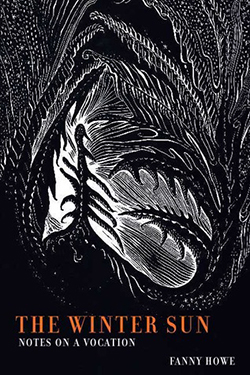The Winter Sun: Notes on a Vocation
by Fanny Howe
reviewed by Ellen Davis
The prolific, much-admired poet, essayist, novelist, and translator Fanny Howe has a new book of personal reflections and profiles of mystics, writers, and thinkers. The author of more than twenty-five books, including two other works of “lyric nonfiction,” Howe’s Selected Poems won the Lenore Marshall Prize in 2001. The Winter Sun: Notes on a Vocation adds to her considerable work in interesting ways.
Howe writes that her work here is designed to uncover the source of her calling, or what she elsewhere refers to as “a vocation that has no name.” In the first of nine sections she writes, “Since early adolescence I have wanted to live the life of a poet. What this meant to me was a life outside the law; it would include disobedience and uprootedness.” These are themes that appear in her poetry as well as her prose.
Her autobiographical material on her early years in Cambridge is, for me, the most powerful part of the book. Howe’s father enlisted in the army when Germany declared war on America, and she and her mother and older sister Susan lived in a railroad flat on Craigie Street in Cambridge, Massachusetts. “The way we lived was in a contained routine within a natural world of great beauty, a world of literature, too, and of news from abroad.”
Howe describes the Boston of her youth as punctuated by “Fridays at symphony and teas at the Athenaeum.” She tells how, when they went to visit their paternal grandfather on Sundays, they had to dress up and sing the “Marine’s Hymn.” She talks about being put to bed early and how she became “hypersensitive to sound, smell, image, experiencing a kind of synaesthesia that held all the parts of my immediate environment together as one.” She also speaks of a “living presence” that she secretly called God.
Her mother, Mary Manning, wrote novels and directed plays at the Idler Club’s Agassiz Theatre at Radcliffe and went on to found the storied Poets Theater. Howe writes of spending a few days in Paris with her mother’s lifelong friend, Samuel Beckett, after leaving school. Her father then got her into Stanford, where she spent time with young Marxists and took a class with Yvor Winters. She recalls seeing Robert Lowell for the first time, dining alone at the Harvard Faculty Club. Life Studies and Lord Weary’s Castle, she writes, “introduced confession and internal rhyme into free verse and showed how personal biography could be of interest to everyone.”
Interesting in a different way are the profiles of scholars, mystics, and writers that occupy the middle of the book. The story of Sara Grant, who joined a convent in Scotland just before her nineteenth birthday, is especially moving. Grant went on to Oxford, where her tutor was Iris Murdoch, and later was sent to India. Using the philosophy of Aquinas, she embarked on a path of reconciling Indian and Christian religions. She became a leading figure in this dialogue, and Howe describes how she discovered Grant’s writing at a hermitage in California. They eventually met in Oxford.
Howe is also excellent on the Brontës, Emily in particular, who “like Simone Weil…had tuberculosis and died of self-starvation.” Howe writes, “It was the moors where she walked a good part of each day that gave her both a heathen and a transcendent spirit, the split consciousness that tore at her novel and poems.”
The last section of The Winter Sun contains epiphanies, thoughts about language and religion, and poems. Howe compares the repetition in poetry to that in religious ceremonies, arguing that, “it is only in the act of working on something, be it manual or mental labor, that you are aware of being at least half at the mercy of a will that is not personal, is not your own.” She writes of God and of actions—like writing—that involve “the process of working on something…with a wholeheartedness that qualifies as complete attention.” This thoughtful, eloquent, wide-ranging book will reward readers of many tastes.
Published on June 21, 2013

